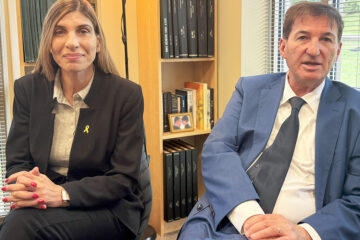The Rebbe’s legacy

By Rabbi Shmuel Klatzkin, Chabad of Greater Dayton
There were many reasons why my path should never have crossed that of the Lubavitcher Rebbe, Rabbi Menachem Mendel Schneerson, whose 20th yahrzeit (anniversary of his death) the world has just marked. My Jewish experience was limited to the liberal variety, and my own mind-set was libertarian. To the degree that I thought of rabbis wearing long black coats, and living lives fully informed by thousands of years of Jewish teachings, I thought of them as confined to the past, or to a few ghettoes of traumatized Holocaust survivors in New York or Israel. In my world, such people lived at an immense distance. Their humanity did not intimately inform mine.
I learned over the years, however, that my humanity informed his.
The Rebbe was a man with a vision. He piloted the unprecedented growth of a tiny, decimated Chasidic sect into a major force on the world stage. Prime ministers and presidents sought his advice and blessing, exchanged letters or made their way to his door. He was a man of vast learning, effortlessly spanning and integrating the breadth of Jewish literature of every sort over the centuries. His knowledge of the world was deep as well; he would engage scientists and authors, military leaders and artists in intense discussions in the fields of their own expertise.
But the Rebbe used his knowledge, pointedly, not to demonstrate how great he was, but rather to relate to people where they lived, in the field of their passion and engagement with life. And no matter how great his vision, he never used his dreams as an excuse to be blind to the pains and the joys of individual people.

He offered no excuses for his Jewish life. It was not justified by a philosophy; it flowed into philosophy. It was not an adjunct of his politics; it informed the way he related to societies and their challenges. He understood that the best way to promote Jewish life and bring others to see its truth and beauty was to live its ideals, deeply understood. And that meant leading with love, the “great principle of the Torah,” “Love your neighbor as yourself.”
No big deal, you might say. Everyone loves love.
But really: everyone loves to be loved. We respond to that easily. But how much do we really love people with whom we disagree?
Agreement was not a precondition for the Rebbe. Love was and is a mitzvah, to be done for its own sake, its intrinsic worth, its power to connect us to the Source of love and life that is the source of the mitzvah.
The Rebbe pointed out again and again that the word mitzvah is related to the Hebrew word tzavta, meaning connection or joining. Of course, mitzvah means commandment. But where does the power of a commandment come from? From the connection it offers to the Source of both the mitzvah and of our very own self.
The excellence of the Rebbe’s work was that he put love first. Yes, he upheld the whole of Jewish law and teaching, down to the smallest detail. But he never insisted you must follow it because he did. Rather, he took upon himself to demonstrate its worth in the most direct way — by engaging people in love.
He wasn’t there to win debates, he told a NASA exobiologist — he was there to touch souls. And souls know when they are touched by love.
Rabbi Jonathan Sacks, past chief rabbi of the United Kingdom, speaks often of how the Rebbe touched him. He related once: “I was an undergraduate, visiting American Jewry to seek out its intellectual leaders. They were impressive. But my encounter with the Rebbe was unique. In every other case, I asked questions and received answers. The Lubavitcher Rebbe alone turned the interview around and began asking me questions. What was I doing for Jewish life in Cambridge? What was I doing to promote Jewish identity among my fellow students?
“The challenge was personal and unmistakable. I then realized that what was remarkable about the Rebbe was the exact opposite of what was usually attributed to him. This was not a man who was interested in creating followers. Instead, this was a man who was passionate about creating leaders.”
The several new biographies of the Rebbe, published in the days leading up to the Rebbe’s 20th yahrzeit, all tell of how the Rebbe never sought leadership. When at last he accepted it, in his first public speech, he spoke of how he needed everyone’s help, for he could not do the job for anyone.
For we are all created in God’s image, and therefore, we all have the power to lead. There are people who want and need each of us to see him or her and to know them, and to love them by calling them to their own better self, to the core of their own meaning. We may not want the job; but how can we refuse?
To read the complete August 2014 Dayton Jewish Observer, click here.





